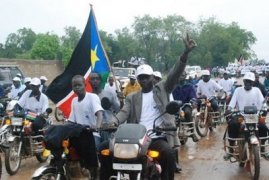Leaders from north and south Sudan have begun talks to form a strategy to deal with the results of a referendum on southern independence, to be held next year.
Talks between the president's National Congress Party (NCP) and the south's Sudan People's Liberation Movement (SPLM) in Khartoum, the capital, focused on planning a peaceful transition for January's referendum.
"These negotiations are an opportunity for us to strengthen our relations because in the past they have been bitter," Pagan Amum, the SPLM negotiator, said at a formal ceremony to launch the talks on Saturday.
The SPLM, which controls the semi-autonomous government in south Sudan, is campaigning for secession while the NCP has pledged to work for unity but promises a fair referendum.
"We are hoping that the negotiation will lead to sustainable peace not in Sudan only but over all the region," Idriss Mohammed Abdel Qadir, the NCP negotiator, said.
Post-referendum options
An African Union panel headed by Thabo Mbeki, the former South African president, has given leaders four options to consider:
1.Creation of two countries which would negotiate a framework of co-operation in a confederal arrangement.
2.Two separate countries with soft borders that permit freedom of movement for both people and goods.
3.Total separation with citizens needing visas to cross the border.
4.Continued north-south unity if southerners choose that option.
The SPLM said the referendum would allow the south to "reset" its troubled relationship with the north, whether southerners choose unity or separation.
"If the choice is separation, then we will be ensuring that there will be good co-operation between the two independent states. It could take the form of a confederation. It could take the form of a common market," he said.
Also on the agenda was the citizenship of their populations. Refugees International, an international refugee aid group, warned last monththat southerners in the north and northerners in the south might be left stateless and vulnerable to attacks should there be a split.
Share assets
Many commentators say southerners, embittered by decades of civil war, are likely to vote for separation in the referendum.
The parties said they would spend the months leading up tp the referendum working out how they would share oil and other assets, as well as the burden of Sudan's national debt, after the vote.
Most of Sudan's proven oil reserves are south of the border, but Khartoum currently gets half the revenues from southern oil under the terms of a 2005 peace deal.
The south would have to reach some sort of agreement with Khartoum, even after a split, as the only pipelines run through the north to the Red Sea.
PHOTO CAPTION
Supporters of south Sudan independence rally in Juba on July 9.
Al-Jazeera


 Home
Home Discover Islam
Discover Islam Quran Recitations
Quran Recitations Lectures
Lectures
 Fatwa
Fatwa Articles
Articles Fiqh
Fiqh E-Books
E-Books Boys & Girls
Boys & Girls  Ramadan
Ramadan Fatwa Audios
Fatwa Audios Month of Mercy
Month of Mercy Women
Women Eed Al- Fitr
Eed Al- Fitr Food Recipes
Food Recipes Videos
Videos

 Prayer Times
Prayer Times












